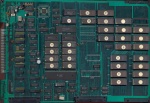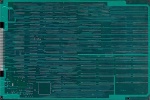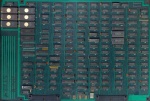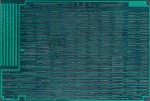Alien Storm (bootleg, set 2): Difference between revisions
m (→CPUs) |
m (→Notes) |
||
| Line 109: | Line 109: | ||
==Notes== | ==Notes== | ||
update 20170604: added pics, better description, confirmed redump | update 20170604: added pics, better description, confirmed redump | ||
---- | |||
update 20170615 from Caius:<br> | |||
As stated in source, sound hardware is totally different from the original Sega System 18.Bootlegers used a single OKI MSM6295 PCM chip for both samples (stored on two device) and BGM (stored in four devices).Pin 7 of the OKI is high (tied to VCC). Clock on pin 5 of the OKI is @ 1 MHz. H-SYNC should be around 14.84 KHz but I'm not really sure, I can see board has some SYNC issue maybe due bad design.V-SYNC is measured @ 58.271 Hz (using an EL4583 SYNC separator with low-pass filter applied). Back to sound: it seems BGM is missing a track (at least music of first level).You can notice it by ourselves looking at this video I made and comparing it to a MAME or original PCB recording: https://www.youtube.com/watch?v=ZUOEtbNiTNk&feature=youtu.be I can't see any faults on PCB so I think this is a limit of the re-engineered sound hardware (like it happens for some CPS1 bootlegs). Maybe we can ascertain this if sound will be hooked up in emulation (currently it's missing). Lastly : there are three PLDs on PCB (one on CPU board, two on video board).All three are secured GAL16V8 and two of them are registered too. I was able to reproduce only two: a combinatorial and a registered with simple logic.The third is a registered one which use a strong feedback. | |||
==Files== | ==Files== | ||
Revision as of 14:55, 15 June 2017
| dumper | f205v, Caius |
| date | 18/04/2006 |
| emulator | MAME 0.119u1 |
| dev | David Haywood |
| name | astormb2 on ProgettoEMMA astormb2 on Arcade Database |
| description | Alien Storm (bootleg, set 2) |
| year | 1990 |
| manufacturer |
Technical references
CPUs
| QTY | Type | clock | position | function |
|---|---|---|---|---|
| 1x | MC68000P10 | main PCB | 16/32-bit Microprocessor - main | |
| 1x | Z8400BB1-Z80BCPU | main PCB | 8-bit Microprocessor - sound | |
| 1x | OKI M6295 | 1 MHz, PIN 7 HIGH | main PCB | 4-Channel Mixing ADCPM Voice Synthesis LSI - sound |
| 1x | LM324N | main PCB | Quad Operational Amplifier - sound | |
| 1x | TDA2002 | main PCB | Audio Amplifier - sound | |
| 1x | oscillator | 24.000MHz | main PCB close to main CPU | |
| 1x | oscillator | 8.000MHz | main PCB close to sound CPU |
ROMs
| QTY | Type | position | status |
|---|---|---|---|
| 9x | M27C512 | 1,2,3,4,5,6,7,8,10 main PCB | dumped |
| 1x | TMS27C256 | 9 main PCB | dumped |
| 21x | NMQ27C010Q | 11-31 main PCB | dumped |
| 6x | NMQ27C010Q | 32-37 ROMs PCB | dumped |
| 1x | N82S123N | ROMs PCB | dumped |
| 1x | N82S129N | ROMs PCB | dumped |
RAMs
| QTY | Type | position |
|---|---|---|
| 2x | UM6264-12L | main PCB |
| 1x | MS6516L-10PC | main PCB |
| 2x | MS6516L-10PC | ROMs PCB |
| 10x | UM6116K-35 | ROMs PCB |
| 2x | TMS62256-12NW | ROMs PCB |
PLDs
| QTY | Type | position | status |
|---|---|---|---|
| 1x | GAL16V8S-20HB1 | PAL1 main PCB | read protected, extracted |
| 1x | GAL16V8S-20HB1 | PAL2 ROMs PCB | read protected, extracted |
| 1x | GAL16V8S-20HB1 | PAL3 ROMs PCB | read protected, not extracted |
Others
1x 28x2 JAMMA edge connector
1x 12 legs connector (legs 2-5 are marked LE RI UP DO, legs 7-10 are marked SER SPE ROL ATT)
1x trimmer (volume)
2x 8x2 switches DIP
Notes
update 20170604: added pics, better description, confirmed redump
update 20170615 from Caius:
As stated in source, sound hardware is totally different from the original Sega System 18.Bootlegers used a single OKI MSM6295 PCM chip for both samples (stored on two device) and BGM (stored in four devices).Pin 7 of the OKI is high (tied to VCC). Clock on pin 5 of the OKI is @ 1 MHz. H-SYNC should be around 14.84 KHz but I'm not really sure, I can see board has some SYNC issue maybe due bad design.V-SYNC is measured @ 58.271 Hz (using an EL4583 SYNC separator with low-pass filter applied). Back to sound: it seems BGM is missing a track (at least music of first level).You can notice it by ourselves looking at this video I made and comparing it to a MAME or original PCB recording: https://www.youtube.com/watch?v=ZUOEtbNiTNk&feature=youtu.be I can't see any faults on PCB so I think this is a limit of the re-engineered sound hardware (like it happens for some CPS1 bootlegs). Maybe we can ascertain this if sound will be hooked up in emulation (currently it's missing). Lastly : there are three PLDs on PCB (one on CPU board, two on video board).All three are secured GAL16V8 and two of them are registered too. I was able to reproduce only two: a combinatorial and a registered with simple logic.The third is a registered one which use a strong feedback.
Files
-
top PCB component side
-
top PCB solder side
-
bottom PCB component side
-
bottom PCB solder side
409



